- Home
- Jessie Haas
Skipping School Page 3
Skipping School Read online
Page 3
He chopped and carried wood indoors until he was more tired than he’d been in months, and starving. Then he sat on a rock by the brook and ate his meat loaf sandwich. It tasted wonderful, washed down with cold brook water. He felt perfectly blank. Nothing to hide. Nothing to prove. His only needs were biological and already satisfied. He just saw things, didn’t even name them to himself.
At last, though, a tiny worm of worry invaded the airy blankness. As soon as he perceived it, Phillip knew how good it was to be blank. Too late. He had to look at his watch, and yes, it was time to go.
People were getting on the buses when he came to the top of the bluff. Despite his good intentions, he was late.
He dropped down the steep hill without holding back. Slap! His sneakers hit pavement, and he was sprinting across the parking lot, dodging between cars. Shouts sounded in his ears: people noticing him as they went to their cars to drive home. The shouts were wordless; the wind in his ears blew the words away.
As he angled behind his own bus, he heard the door close, the engine start to make a let’s-get-moving sound. One of Phillip’s knees buckled, but he lurched forward and banged the door with the flat of his hand. The driver glanced his way, casually pushed the handle to let the door open. Not his disaster if some boy missed the bus. Not his business to ask why the boy was late. Panting, weak-kneed but serene, Phillip slowly mounted the steps, made his way down the aisle, and dropped into the seat beside Kris.
Her eyes raked his face. If you were feeling vulnerable, that look of hers could almost seem to scratch you. Today Phillip felt unscratchable, as if his face were made of hardened steel. He leaned back against the seat, feeling cheerful, while his pumping heart ran down a little and his breathing slowly relaxed.
“I’ve got a pear,” Kris said finally, touching her crumpled lunch bag. “If you’re hungry.”
“Not really,” Phillip said, and almost smiled at her alert look. He imagined a sharp yellow pencil making a note in her squared, rapid script: Not hungry Friday. “Want to split it?”
The mental pencil paused. She met his eyes, and then took the pear out of her bag and handed it to him.
NO EATING ON THE BUS, said a sign up over the driver’s head. The sign also prohibited swearing, smoking, and being in the aisle when the bus was in motion.
The pear was ripe and very good.
It took the clinic to bring him down: seven greyhounds that had blown their last chance in the Thursday Night Trifecta; Mrs. Farley’s cat, whose pale, depleted blood could no longer carry oxygen, wailing for breath after his fluid shot; Dr. Franklin swearing at the sound, while tears trickled into his beard, later drawing Mrs. Farley gently aside to try to persuade her, still later flinging out of the clinic in a rage.… Soon the gray house was so far away that it might as well not exist. As Phillip knelt and wrapped his arms around a doomed greyhound, waiting for Dr. Rossi to kill it, he was surprised at the soreness in his shoulders and for a few seconds could not think where it came from.
“I hate to do this to you, Phillip,” said Dr. Rossi when all the dogs were dead, “but I can’t bear to deal with Hugh again. Will you bring me the kittens?”
Phillip turned, openmouthed. But … he thought. But … I’m a high school kid. I’m … I’m not … make him!
Feeling as if he were walking underwater, he got a clean litter box and put the kittens in it. Phillip tried not to look at them, but the feel of their round, sturdy rib cages was imprinted on his hands. He put the litter box on the table before Dr. Rossi and stood there herding the kittens back inside it as she filled her syringe.
She turned now. Her large, compassionate eyes crossed his face, paused, came back again. “Phillip?”
He looked away, and his eyes had to fall on the kittens.
“I’m sorry, Phillip. I shouldn’t … quite often I forget how young you are.” She touched his shoulder gently. “Go on. I can manage by myself.”
Phillip shook his head. She couldn’t manage—hold a squirming kitten and find a vein—and her compassion was misplaced. He would go on living.
He picked up the first kitten. The other two immediately scrambled out of the box and prowled to the edge of the table, with amazed expressions. The one in his hands squirmed, furious at being restrained.
Dr. Rossi approached with her needle. How sad she looked, like a lady in an old painting. Phillip pressed the kitten flat on the table. It let out a little, complaining mew, and he thought how he would like to lay his head on Dr. Rossi’s shoulder and cry. She would let him—and that’s what Dr. Franklin wanted, too, but she wouldn’t let Dr. Franklin.…
He let the kitten up.
“Phillip?” Dr. Rossi looked at him again. Her large eyes were almond-shaped, with heavy lids and artful makeup. He loved to have her look at him.
“I’ll take them,” he said, watching her eyes. They looked puzzled—maybe a little annoyed?
“Why?” she asked.
Why? thought Phillip. He looked at the kittens, cautiously reviewing their options at the rim of the precipice. Unthinkable, to sink a needle into them and stop all their motion and discovery. But it was always unthinkable, and it continued.
He looked back into Dr. Rossi’s eyes, wishing to say something, to see himself mirrored there. But he had nothing to say that would be bold enough to show up, only the sensation of a round, sturdy body in his hands, a confused feeling in his heart, and a secret resource.
He began putting the kittens back into the litter box. “Can I leave them here until office hours tomorrow?”
Dr. Rossi was frowning. “I don’t like this, Phillip. We’ve been here before, and you can’t keep on doing it.”
Again he had no answer. He could only look at her mutely, thinking how beautiful her eyes were and hoping she couldn’t read his thoughts, spreading his hands wide to keep the kittens down in the pan. Trying not to think ahead.
She shook her head in frustration. “Oh! You’re as bad as Hugh, in your way! Put them back in the cage!”
CHAPTER SIX
All the way home Phillip tried to make his brain consider what he’d done and what it meant for the future. His brain refused to consider at all. It glossed right over the strange car in the driveway and had forgotten completely that Carrie was coming home. But there she sat at the table, perking up the whole room with her blond head of curls and her animated face. Someone else sat there, too, back to the door—a guy.
“Oh, hi, Phlip!” Carrie said, checking with the other person as she spoke his silly nickname. “Wow! You really work late!”
“Hi,” said Phillip. The kitchen was warm and smelled like leg of lamb with rosemary.
“Phillip, I want you to meet somebody,” said Carrie, her eyes checking with the somebody again. “This is Derek Hansen. Derek, my little brother, Phillip. Derek is studying to be a nurse, too.”
A nurse! thought Phillip, moving so Derek’s face came into range. Oh, well, nothing wrong with that, said the liberal, modern, and tolerant section of his brain, correcting his first surprised thought. But tolerance and adjustment came to an abrupt end when he got a look at Derek.
It couldn’t be easy for a guy to go into something like nursing. He could do it because he really cared about people and had a need to help them on a personal, physical, day-to-day level. Or he could do it because he’d be certain of getting a lot of attention and getting girls. Looking at Derek’s smug, smiling face, Phillip was sure he knew which.
Typical Carrie! For a beautiful girl she wasn’t nearly skeptical enough about the male character.
Of course, she was head over heels in love. Phillip had seen it before, but never worse than this. She was explaining about his job at the clinic now, in a tone of voice that made him sound like an exceptionally clever five-year-old. Phillip squirmed inside.
“So, Care, how’s school?” he interrupted.
“Oh, great! I really like it!”
Too many exclamation points. Carrie wasn’t an exclamation point girl.<
br />
“Think you’re gonna like spending the rest of your life with sick people?”
His mother dropped a spoon on the stove top. Derek swung his bored hazel eyes to look at Phillip, as if noticing him for the first time, and Carrie flushed angrily. In the sudden silence they could hear the murmur of the TV in the living room and the sound of his father’s breathing.
“Sorry,” said Phillip. “Bad question!”
“As you can see, Derek, my brother can be quite the little jerk!”
“Oh, no,” said Derek. “I think it’s a good question, actually.”
The anger drained from Carrie’s face. She gazed at Derek respectfully, waiting for the pearls of wisdom to drop from his lips.
“It’s something you have to ask yourself,” Derek went on. His eyes traveled from Carrie to Phillip: Am I holding your attention? You slimeball! thought Phillip, opening his eyes wide and gazing raptly. “For me,” said Derek, “it comes down to being of service. As long as I know I’m helping, I can hack it. But it’s tough.” His eyes took on a look of suffering, and Carrie flushed with sympathy.
“What if you can’t help?” asked Phillip. “What if they’re dying, and that’s just it?”
“Well, that’s where faith comes in,” said Derek, smiling.
The wail of Mrs. Farley’s cat sounded in Phillip’s ears. He thought how pleasant it would be to punch Derek.
“Derek’s very religious,” said Carrie proudly.
“Oh, yeah? What religion?”
“You probably haven’t heard of it.”
“Moonie?” asked Phillip.
“No, I belong to the Reformed Church of the Brethren,” said Derek. His eyes were impossibly limpid and mild, but far from selfless. Derek was enjoying the way he handled his girlfriend’s hostile little brother. Phillip held his own sweet smile in place with a great effort. He knew he could never outsmarm Derek, and he waited for something that would let him break off honorably.
His mother had the same idea. “Phillip, have you washed up? Supper’s almost ready.”
“Don’t forget behind your ears!” said Carrie.
“Yeah, Care, I’ll wash my mouth out with soap, too!” He went into the bathroom, almost whistling. Anyway, it was good to have Carrie home.
In honor of the guest, his father sat at the table. He ate little. Derek served him obsequiously, jumping to hand him the potatoes, the gravy, the relish. Carrie watched her father, biting her lip, or looked at Derek with tear-filled, grateful eyes. The smiles Derek gave her in return were warmly encouraging, modest, and noble.
But try though Derek might, by dropped hint or direct question, he couldn’t draw the sick man into conversation. He smiled when it seemed to be expected. He nodded kindly; but he seemed to be listening to something else, and his eyes never once sharpened on Derek in the old way.
Eventually Derek gave up on conversation in favor of monologue, glancing at Carrie from time to time as you might glance at your own handsomeness in a mirror.
This was fun, Phillip realized. Hating Derek gave him something interesting to think about, and listening to Derek was stimulating. It stimulated him to disgust and contempt, anyway, and that was better than nothing. He was rather disappointed after supper, when Carrie and Derek went for a walk.
“Save the dishes, Mom,” Carrie said. “We’ll do them when we get back.”
Phillip watched them go down the driveway. Derek put his arm around Carrie’s waist, and she hugged him, as if in sheer relief at getting away from her awful family for a few minutes.
Phillip did the dishes himself, over his mother’s protest. She really had nothing else to do, and it was no treat to gain an extra half hour for television. But Phillip was then able to greet Carrie and Derek with a dish towel in his hand and a saintly-looking smile on his face. He’d invented it, using his reflection in the window over the sink.
He was in his room later, making a lid for his bike basket, when Carrie came in. She closed the door, but Phillip could still hear Derek’s voice, explaining to their mother why he wanted to be a nurse rather than a paramedic or a doctor. Not enough guts, not enough brains, thought Phillip—unfairly, since Carrie had plenty of both—but Derek called it “a dedication to humble service.”
“Phlip, why are you being such a jerk about him?”
Did she really want to know, Phillip wondered, or was she just positioning for the attack? He took a chance.
“He’s the kind of guy that’s always got one eye on the mirror. You know what I mean?”
“No, I don’t know what you mean!”
“Yeah, you do. Derek cares about Derek, period.”
“He also happens to care quite a lot about me!”
“You’re just another mirror to him, Care. He checks with you to make sure his personality’s on straight.”
“Well, who doesn’t do that, smarty? Who doesn’t use other people to check up on themselves? What about you and your little friend Kris?”
No, thought Phillip. He didn’t want to see himself in Kris’s eyes. He usually assumed he was invisible to her, and then she got mad.
But don’t ask me about Dr. Rossi!
“See?” said Carrie. Because he was silent, she thought she was winning. “Everybody likes people who show them in a good light!”
“So what does this guy show you back, Care, that you can’t get from your average bathroom mirror? Huh? What does he know about you that we don’t?”
“He happens to—”
“Carrie! Phillip!” Their mother stood in the doorway, looking distressed. “We can hear you out there!”
Carrie flushed deeply and turned away. A moment later Phillip heard the bathroom door shut.
“Aren’t you two a little old for this?” asked their mother helplessly.
Phillip bent over his bike basket, waiting for her to go away.
“Couldn’t you be a little nicer, Phillip? She’s going through a very hard time.…”
“Yeah, sure,” said Phillip, thinking: Why am I always taking the heat for everybody else’s hard time? I’m supposed to be Superboy or something? The kid who can take anything?
Maybe he was invisible. Maybe he had such a flat personality, such an ordinary face that people passed right over him without noticing. He felt like a person cracking apart, but all anybody else saw was a vague shape, taking up space. Presumably the shape looked reliable since people kept trying to rely on it.
He heard his door close and realized that his mother had been standing there for some minutes, watching him.
CHAPTER SEVEN
Phillip awoke late, to an empty house. “Gone shopping, etc.,” the note on the table said.
That was fortunate, Phillip thought. Now he wouldn’t have to make up an explanation for being gone all afternoon. He’d disappear before anyone came back to be explained to.
After breakfast he got two pot-pie tins and a quart freezer bag of Thea’s food and went out the door. He had a whole morning to kill before it was time to pick up the kittens. Go to Kris’s and get his homework, he decided.
As he was putting the cat food and dishes into his bike basket, he saw Thea crossing the front yard. Phillip spoke; she didn’t come. Since they’d given her the freedom to roam, she had turned away from them somewhat—a grown-up now, with business of her own. He picked her up. She stared at him with eyes the color of lemon slices, wild and empty.
“Hey,” he said, “remember me?” She squirmed out of his arms.
Slightly melancholy, Phillip got on his bike and rode to Kris’s house.
The car, the trunk of which held all his homework, was not in the driveway. No one was home.
Kris would be at Aunt Mil’s house, working and talking. Aunt Mil, at eighty-three, was her best friend.
Which is weird, thought Phillip, biking lazily along the quiet streets. Yet when he was with them, the friendship seemed perfectly natural. Kris was more at home with grown-ups than with kids. At school she seemed out of place, too high
-powered for the company she had to keep. Of course, there were parts of her life he didn’t see, like the debate team. Maybe with Handsome Dan Morgan, Heidi Holler, and Alice Knapp, she fitted right in—
Almost without planning it, he found himself in front of the little brown house.
He could hear voices out in back as he wheeled his bike inside the picket fence. He walked slowly toward the corner, never completely stopping and so not technically eavesdropping.
“… the opposite of anthropomorphism,” Kris was saying.
“Exactly!” Aunt Mil’s voice. “You would never expect an animal to give you something it doesn’t have—you know better. But I think that distinct line you draw makes you expect too much of people. We don’t always have the strength it takes to speak of things, or the self-knowledge either.”
Kris made a disgusted sound. “Makes you wonder why we ever invented language if we aren’t going to use it!”
“Use your eyes instead, Kris. You know how to observe animals—”
“Diana, no!” Kris interrupted. “Sorry, I think she hears a cat in the front yard.”
Phillip glanced over his shoulder and then realized he was the cat. He lengthened his stride and walked around the corner, hoping he looked casual.
All three were watching for him: the tall, lean greyhound and the tall old woman, her face drawn with cold and her beaky nose especially prominent, and Kris, who flushed slightly and raised her chin and looked directly at him with an intent, determined expression. All three, creatures of prey. He felt like a rabbit, innocently blundering into the open.…
“Hello, Phillip,” said Aunt Mil quietly.
“Um … hi.” They were still waiting. “Um … my homework? The car was gone—”

 Chase
Chase The Sixth Sense
The Sixth Sense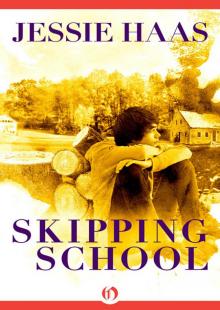 Skipping School
Skipping School Keeping Barney
Keeping Barney Unbroken
Unbroken Westminster West
Westminster West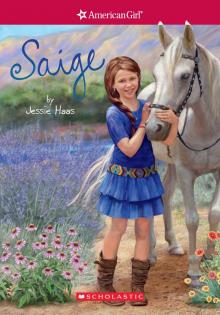 Saige
Saige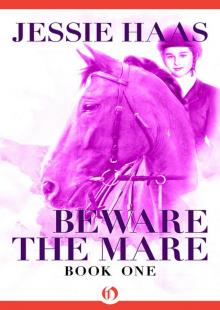 Beware the Mare
Beware the Mare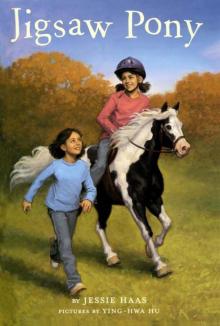 Jigsaw Pony
Jigsaw Pony Rescue
Rescue Saige Paints the Sky
Saige Paints the Sky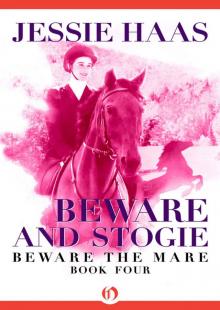 Beware and Stogie
Beware and Stogie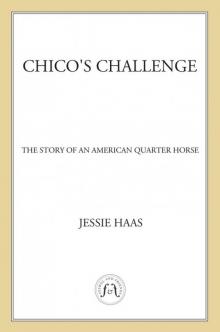 Chico's Challenge
Chico's Challenge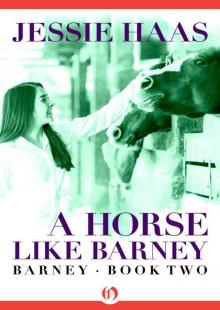 A Horse like Barney
A Horse like Barney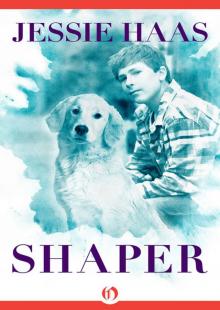 Shaper
Shaper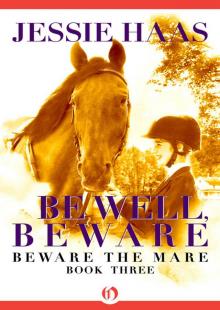 Be Well, Beware
Be Well, Beware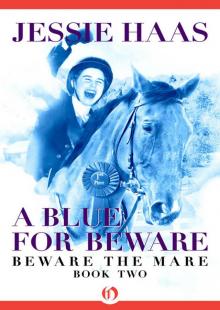 A Blue for Beware
A Blue for Beware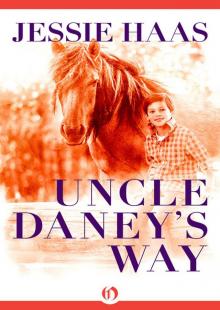 Uncle Daney's Way
Uncle Daney's Way